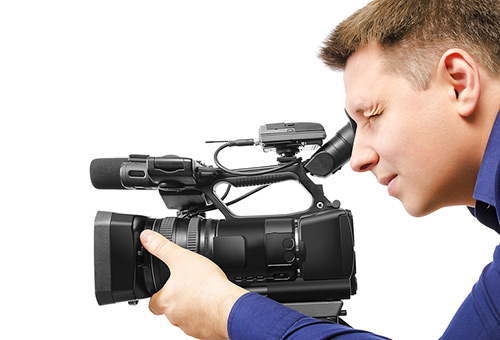Reliable Legal Videography for Hearings.
The Role of Lawful Videography in Depositions and Trials
Lawful videography has emerged as a vital tool in both depositions and trials, offering a multifaceted approach to documenting witness testaments. As lawful experts progressively recognize its worth, it prompts a much deeper evaluation of just how these visual documents can influence juror understandings and test end results.
Value of Legal Videography
Legal videography plays a pivotal duty in the paperwork and presentation of depositions and tests. This specialized area integrates technical abilities with lawful understanding to create a reputable record of process that can dramatically affect case end results. The appearance of lawful videography improves the understanding of witness testimony, permitting jurors and judges to observe not just the talked words but additionally the attitude, emotions, and body movement of the witnesses.

The relevance of lawful videography prolongs beyond the court room; it additionally plays a crucial function in preserving proof for future referral, whether for allures or additional legal action. Its integration right into the legal procedure is necessary for guaranteeing a reasonable and precise representation of the realities, eventually adding to the quest of justice.

Refine of Legal Videography
While capturing the subtleties of depositions and trials, the process of lawful videography entails several important steps that guarantee high-grade, accurate recordings. A specialist lawful videographer prepares by reviewing the situation products and recognizing the specific demands of the deposition or test. This prep work consists of familiarizing themselves with the participants and the context, which aids in catching pertinent details.
On the day of the recording, the videographer establishes the required devices, which normally consists of high-def electronic cameras, microphones, and proper lighting. Ensuring optimal angles and sound quality is critical, as it straight affects the efficiency of the recording. The videographer interacts with lawyers and participants to establish protocols, guaranteeing that everyone understands the recording process.
Throughout the deposition or test, the videographer thoroughly tapes the procedures, paying close interest to both verbal and non-verbal cues. legal videography. This consists of recording the temperament and responses of witnesses and attorneys. After the session concludes, the videographer may modify the video for clearness and compliance with lawful criteria, creating a final product that properly shows the procedures for future reference and use in lawful contexts
Benefits in Depositions
The incorporation of videography in depositions offers countless advantages that enhance the total procedure of gathering evidence. One key advantage is the ability to capture witness testaments with aesthetic and auditory fidelity, giving a much more accurate depiction of the witness's attitude, tone, and body movement. This multidimensional approach permits lawyers and courts to evaluate trustworthiness better than typical written records alone.
Additionally, videographed depositions act as an effective device for preserving statement. Must a witness ended up being inaccessible for test, their tape-recorded deposition can be played in court, making certain that their proof remains obtainable and appropriate. This facet considerably lowers the risk of shedding essential info that can impact instance outcomes.
Moreover, making use of legal videography promotes far better preparation for attorneys. Examining video clip footage allows legal groups to assess and refine their techniques, recognizing strengths and learn this here now weaknesses in their cases. This preparatory advantage can cause even more engaging presentations in court.
Lastly, videography improves the general professionalism and trust of the deposition procedure, instilling self-confidence in customers regarding the thoroughness of their legal representation. By leveraging technology, attorneys can substantially boost the performance of depositions.
Effect On Tests
In many trials, the integration of videography can significantly influence the presentation of evidence and the court's assumption. Lawful videography records witness testaments and critical proof in a vibrant layout, permitting jurors to involve with the product on several levels. This visual component enhances the narration facet of a test, supplying context and psychological resonance that conventional text-based evidence might do not have.
Additionally, video clip recordings can function as powerful devices for impeachment throughout interrogation. When inconsistencies develop between a witness's prior declarations and their court room statement, video evidence gives an unbiased recommendation that can sway jurors' opinions. This immediacy and quality can strengthen the credibility of a party's story while concurrently weakening opposing disagreements.
Additionally, the usage of videography can assist improve complex details, making it much more accessible to jurors that might struggle to understand detailed details provided only through spoken testament. By combining visuals with auditory info, lawful videography can enhance retention and understanding, inevitably affecting the court's decision-making process. The influence of videography Your Domain Name in trials expands beyond simple aesthetics; it plays a vital duty in forming the legal landscape and results.
Future Trends in Legal Videography
As we look towards the future of legal videography, a number of arising trends guarantee to improve its role within the court. One substantial trend is the combination read more of artificial intelligence (AI) in video clip evaluation and editing - legal videography. AI can improve the procedure of identifying essential minutes in videotaped depositions, allowing attorneys to promptly access relevant material, consequently enhancing efficiency in situation preparation
In addition, the surge of virtual reality (VR) and increased fact (AR) technologies is expected to transform exactly how jurors experience evidence. By submersing jurors in a substitute setting, these modern technologies can provide a much more profound understanding of complicated situations, bring about even more enlightened deliberations.

In addition, the increasing demand for remote depositions, increased by the COVID-19 pandemic, will likely continue. Legal videographers will need to adjust to brand-new software and systems to ensure premium recordings in online settings.
Lastly, the growing focus on information protection will certainly demand more stringent procedures for storing and sharing video proof. As the lawful landscape advances, lawful videographers need to stay abreast of these trends to maintain their importance and performance in the judicial procedure.

Final Thought
In summary, lawful videography serves a crucial feature in the judicial process, boosting the stability of depositions and trials. By catching the nuances of witness testaments, this medium not just preserves crucial evidence yet also help in presenting details efficiently to jurors. The relevance of visual documents in assessing credibility and promoting cross-examination can not be overemphasized. As innovation proceeds to develop, legal videography is poised to more transform its duty within the legal landscape.